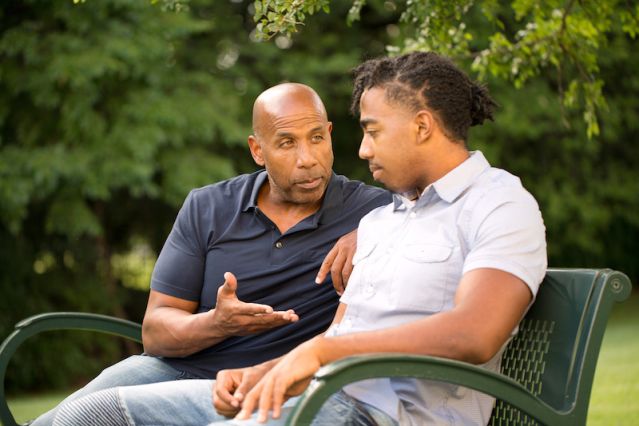Family Dynamics
4 Tips and 8 Steps to Get Closer With Your Adult Child
Here's how to become emotionally closer with an adult child who seems distant.
Posted December 5, 2023 Reviewed by Michelle Quirk
Key points
- Many adults love their parents but do not feel emotionally close to them.
- Even if the parent and child live near each other, parents can also feel the lack of emotional closeness.
- When disconnection is sensed in a parent-child relationship, the burden to act falls on the parent.

Joan ends her brief phone call with her son, Jack, feeling sad and disconnected. He shared with her that he’s going out of town with his girlfriend over the holiday weekend, so he won’t be able to stop by for a visit. Joan was surprised; she didn’t even know Jack was dating someone. She wished he had told her. She wished he’d come visit more. “Did I do something wrong?” Joan asks herself. “I wish we were closer…”
Joan is not alone in her desire to be closer to her son. Scores of parents around the world have a longing for closeness with their child that just isn’t there. These parents have adult children who move far away, call infrequently, or share very little about their lives.
This can be confusing, especially if you fall into the category of parents who provided their child with all the right things—a loving home, a good education, financial support, and maybe even family vacations. However, parenting is so complex and delicate that it can be easy to make unintentional errors. And there’s one error that far too many parents, good people just like Joan, have made.
Childhood Emotional Neglect: The Wall Between Us
This subtle and often invisible error is childhood emotional neglect. Childhood emotional neglect happens when you fail to respond enough to your child’s emotions and emotional needs. It can go unnoticed by you, your spouse, and your children, silently creating a wall between you and your child.
The effects of childhood emotional neglect are great. Your child never received enough of the emotional attention, emotional knowledge, and emotional awareness they desperately needed. They might feel as though you don’t know them in a deep, meaningful way. Since emotions are at the core of who we are, it’s quite possible that they feel unseen and unknown by one of the most important people in their lives: you.
Since emotions didn’t take up space in your home, they still don’t take up enough space now in your relationship with your child. You might recognize your conversations seem surface-level. You might be surprised when your child shares recent decisions they’ve made, as you are prone to discussing events and facts rather than feelings.
I realize that acknowledging you have emotionally neglected your child is painful. It’s painful because it wasn’t intentional, and if you knew you were doing it you would have wanted to do things differently. It’s painful because you notice the wall between you and your child today and desperately wish it would disappear.
To repair or enrich your relationship with your child, follow the tips and steps below, abridged from my book, Running on Empty No More: Transform Your Relationships With Your Partner, Your Parents & Your Children.
4 Tips Before You Start
1. Take initiative. Because you are the parent, it’s your job to make the first move toward repair.
2. Remove self-blame. You parented the best you could with what you had and knew. The mistake of childhood emotional neglect is not intentional. Repairing your relationship will happen much more effectively if you leave feelings of guilt and blame at the door. Focus on starting anew and moving toward connection.
3. Listen. Make a concerted effort to move your focus away from logistics and facts and toward your child’s feelings. Interact with your child with open curiosity and without judgment.
4. Don’t take unwarranted responsibility. A common mistake parents make when attempting to fix their relationship is taking too much responsibility for their child’s life and potential struggles. You can acknowledge your emotional neglect piece while also giving your child the autonomy to resolve their own. Each and every person must go through the recovery process independently. Relationship repair is just one of the incredible gifts of recovery.
How to Get Closer to Your Adult Child
- Ask your child if you can talk with them about something important. Emphasizing the importance of this conversation will allow them to know that you are taking this seriously and can help give you the adequate space needed to talk.
“Hey, Jack. I’m wondering if you have some time this week to sit down for coffee. I have something important I’d like to talk with you about.”
- Preface what this conversation is about.
“Thank you for taking the time to meet. I’ve been feeling quite distant from you, and I’ve decided to finally fix what’s been missing. I want us to be closer and more connected.”
- Check in with your child to see their reaction. Do they notice the distance? Do they want to be closer to you as well? Whatever their response, listen openly and validate their experience.
“Tell me how you feel about this. I’d love to hear if you feel similarly, or any other feelings you have about our relationship.”
- Share with them about your discovery and journey of childhood emotional neglect. Educate and allow space for questions.
“I came across an article about childhood emotional neglect online and felt as though I had finally been seen. It’s invisible and so difficult to identify, so I feel lucky that I finally have pinpointed what happened in my own childhood and what I passed down to you. It has created a wall between me and my emotions… a wall between me and you.”
- If your child seems hesitant to discuss this with you, keep the conversation on you, your feelings, and your experience.
“You know my mom, your grandmother, was a single mom with two jobs. She worked so hard to take care of me, and I appreciate that so very much. But I also realize now that she was so busy supporting us financially that she didn’t support me emotionally…”
- If and when your child acknowledges an issue in your relationship, ask questions and listen carefully to their answers.
“Thank you for being open with me and talking about this; I know it’s challenging. I’d really like to know how that has impacted you.”
- Validate what they say and any feelings they share. Validation does not mean you agree; it simply means you hear and understand what your child is expressing.
“I hear you saying you feel this wall between us, too. It is sad. I’d like to hear more…”
- Ask what you can do differently in your relationship from now on. Make sure their request is reasonable and healthy.
“Is there anything I can do from now on to start chipping away at this wall? I’m committed to making changes.”
- Assess your expectations. Your first conversation won’t make everything better. You may meet resistance, and that is OK. This is something that will likely need to be talked about more than once.
“I don’t expect everything to change after this conversation. But I’m up for having more conversations like these if you are.”
- Keep at it! If your child doesn’t seem interested and if you continue to feel the distance, take heart. Your trying is enough.
“Hi, Jack. I wanted to thank you again for having that conversation with me. I’m here whenever you’d like to talk again.”
© Jonice Webb, Ph.D.
References
To determine if you might be living with the effects of childhood emotional neglect, you can take the free Emotional Neglect Questionnaire. You'll find the link in my bio.
Jonice Webb, Ph.D. Running on Empty No More: Transform Your Relationships With Your Partner, Your Parents & Your Children. 2018, Morgan James New York.




